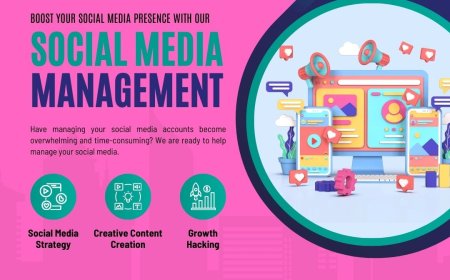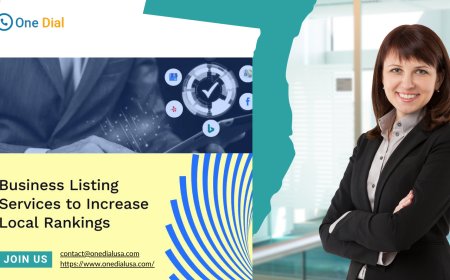How to Optimize Google Ads for AI-Powered Search
Learn advanced strategies to optimize Google Ads for AI-powered search in 2025. Discover tips, tools, and expert insights to enhance your campaigns. Services by Rank Locally UK.

As AI becomes the backbone of search engines like Google, digital advertising is undergoing a transformative shift. In 2025, Google Ads campaigns must be tailored not only for human users but also for AI algorithms interpreting intent, context, and behavior. This guide will walk you through everything you need to know about optimizing your Google Ads for AI-powered search.
From smart bidding strategies to the role of responsive search ads and natural language processing, well cover it all. Plus, you'll learn how Rank Locally UK can elevate your ad performance with expert support across SEO, web development, digital marketing, and online reputation management.
Table of Contents
-
Introduction to AI-Powered Search
-
The Impact of AI on Google Ads
-
Understanding User Intent Through AI
-
Smart Bidding: Machine Learning at Work
-
Responsive Search Ads and Dynamic Content
-
Data-Driven Campaign Structures
-
Optimizing for Voice and Conversational Queries
-
Harnessing First-Party Data for Ad Personalization
-
AI Tools for Ad Copy Optimization
-
Using AI to Refine Keyword Targeting
-
Campaign Performance Prediction with AI
-
Aligning Ads with Googles AI Search Features (SGE)
-
Audience Targeting in the Age of AI
-
Integrating Local SEO and Google Ads
-
How Rank Locally UK Powers Your AI-Ad Strategy
-
Final Thoughts
-
FAQs
1. Introduction to AI-Powered Search
Search is no longer just keyword-based. Googles integration of AI algorithms like BERT and MUM understands meaning, context, and user behavior patterns. The future of Google Ads depends on aligning with these advancements to remain relevant.
In this AI-first era, campaigns must:
-
Align with conversational queries.
-
Reflect search intent and semantic context.
-
Be optimized dynamically and intelligently.
2. The Impact of AI on Google Ads
AI has reshaped Google Ads in several ways:
-
Predictive Targeting: AI predicts who is most likely to convert.
-
Smart Bidding: Real-time adjustments to maximize performance.
-
Ad Personalization: Highly contextualized, relevant ad delivery.
-
Natural Language Processing: Better match with long-tail search terms.
To stay competitive, advertisers must adopt AI-driven tools and techniques.
3. Understanding User Intent Through AI
Google's algorithms focus on search intent more than keywords. For example:
-
Best running shoes for flat feet = commercial intent.
-
How to relieve foot pain = informational intent.
Create campaigns that match these intents by:
-
Crafting ad copy that solves a problem.
-
Building relevant landing pages.
-
Grouping keywords by intent, not just theme.
4. Smart Bidding: Machine Learning at Work
Smart Bidding strategies like Target CPA, Target ROAS, and Maximize Conversions use machine learning to:
-
Predict conversions.
-
Adjust bids in real-time.
-
Learn from audience signals.
To get the most out of smart bidding:
-
Ensure conversion tracking is set up properly.
-
Give the algorithm enough data (~50 conversions per week).
-
Let the system learn before making drastic changes.
5. Responsive Search Ads and Dynamic Content
Responsive Search Ads (RSAs) are essential in an AI-powered environment. Google automatically tests and matches headlines and descriptions for optimal performance.
Tips for high-performing RSAs:
-
Use diverse headlines with different CTAs.
-
Match some headlines to keywords and others to value propositions.
-
Include emotional triggers or urgency (limited time offer).
6. Data-Driven Campaign Structures
Traditional campaign structures are giving way to more flexible ones:
-
Broad match keywords + Smart Bidding = modern best practice.
-
Performance Max campaigns use Googles AI to serve ads across Search, Display, YouTube, and Gmail.
Build your campaigns with:
-
Clear audience signals.
-
High-quality creative assets.
-
Defined conversion goals.
7. Optimizing for Voice and Conversational Queries
Voice search continues to rise. AI interprets voice queries with nuance:
-
Queries are longer and more conversational.
-
Focus on natural phrasing and questions.
Incorporate FAQs and long-tail phrases into your ad copy and landing pages to align with voice search behaviors.
8. Harnessing First-Party Data for Ad Personalization
With the decline of third-party cookies, first-party data is gold:
-
Leverage data from CRM systems, email lists, and past conversions.
-
Build custom audiences for remarketing and lookalike targeting.
Rank Locally UK integrates CRM tools and audience segmentation for personalized Google Ads campaigns that convert.
9. AI Tools for Ad Copy Optimization
Tools like ChatGPT, Copy.ai, and Google's AI-powered Insights Hub help:
-
Generate high-converting ad copy variations.
-
A/B test messaging automatically.
-
Monitor engagement and CTR trends.
Human + AI synergy = the most powerful creative combination.
10. Using AI to Refine Keyword Targeting
Modern AI tools dont just suggest keywordsthey suggest intent clusters:
-
Use tools like SEMrush, Ahrefs, or Google's Keyword Planner enhanced with AI filters.
-
Group keywords by buyer journey stages.
-
Prioritize context over volume.
11. Campaign Performance Prediction with AI
Googles Insights and Forecast tools now offer:
-
Conversion forecasting based on historical trends.
-
Suggested optimizations and budget adjustments.
-
Insights into competitor movement.
These insights help you make smarter, faster decisions.
12. Aligning Ads with Googles AI Search Features (SGE)
Googles Search Generative Experience (SGE) changes how results are displayed. Ads may appear:
-
Within AI summaries.
-
Contextually linked to AI-generated answers.
Strategies to align with SGE:
-
Use natural language in ad copy.
-
Optimize for topical authority.
-
Provide high-quality, structured content on your landing pages.
13. Audience Targeting in the Age of AI
The shift is from demographics to behavioral patterns and predicted intent:
-
Use Custom Intent Audiences.
-
Leverage in-market audiences and similar segments.
-
Layer on geographic and device-level targeting.
For local businesses, Rank Locally UK offers local SEO support for enhanced audience precision in paid campaigns.
14. Integrating Local SEO and Google Ads
Local businesses thrive by combining local SEO services with AI-enhanced Google Ads.
Steps include:
-
Geo-targeting ads around store locations.
-
Including keywords like near me or in [city name].
-
Creating landing pages optimized for local intent.
Use support from a local SEO company like Rank Locally UK to ensure local ads rank and convert.
15. How Rank Locally UK Powers Your AI-Ad Strategy
Rank Locally UK is a full-service digital marketing powerhouse that helps businesses optimize their Google Ads for the AI age. Heres how we can help:
Google Ads + AI Strategy
-
Full-funnel campaign development.
-
Advanced conversion tracking setup.
-
AI-based performance analysis.
Expert Support for SEO and Local SEO
-
Were the Best SEO Company with expertise in local, national, and ecommerce SEO.
-
Our local SEO experts tailor ad campaigns that dominate your region.
AI-Friendly Websites
-
As a Web Development Company, we build lightning-fast, AI-optimized landing pages.
-
Services include custom web design, ecommerce website development, and more.
Digital Campaign Management
-
As a digital marketing company, we provide cohesive campaign management across search, display, and social.
-
Ranked as a top digital marketing company in the UK.
Online Reputation & Trust
-
With reputation management services, we protect your brand and support high ad trust scores.
Partner with Rank Locally UK for affordable, high-impact solutions in a competitive AI-driven advertising world.
16. Final Thoughts
AI is not the future of Google Adsits the present. To thrive in this evolving landscape, advertisers must combine strategy with automation, and data with creativity.
If youre ready to evolve your Google Ads performance in 2025 and beyond, consider teaming up with the Best Seo Expert and digital growth specialists at Rank Locally UK.
17. FAQs
1. What is AI-powered search in Google Ads?
AI-powered search uses algorithms to understand user intent, context, and behavior to deliver better ad results.
2. How does Smart Bidding work?
Smart Bidding uses machine learning to optimize bids for each auction based on conversion data.
3. Are Responsive Search Ads better for AI-powered search?
Yes, RSAs dynamically adapt to show the best message to users based on AI testing and analysis.
4. What is Googles Search Generative Experience (SGE)?
SGE provides AI-generated answers and may include ads within these summaries, requiring ad content to be contextually strong.
5. How can I improve my Google Ads performance with AI?
Use Smart Bidding, responsive ads, first-party data, and AI tools for keyword and copy optimization.
6. Should I use broad match keywords with AI-based bidding?
Yes, broad match works well when paired with Smart Bidding and intent-based targeting.
7. How does local SEO improve Google Ads?
It enhances geo-targeting, improves Quality Score, and aligns with local search behavior.
8. Can AI help write better ad copy?
Yes, AI tools generate and test high-performing headlines and descriptions.
9. How do I optimize for voice search in Google Ads?
Use natural language, FAQs, and conversational phrasing in your ad copy and content.
10. What kind of data should I collect for personalization?
Collect email opt-ins, CRM activity, past purchases, and site behavior to personalize ads.
11. How important is landing page quality in AI search?
Very importantGoogle evaluates landing page relevance and speed as part of ad quality.
12. Is it still useful to hire a Google Ads agency?
Yes, especially agencies like Rank Locally UK that understand AI-based advertising.
13. What budget do I need to start with AI-optimized campaigns?
A minimum of 500/month is recommended to allow algorithms to collect data and optimize.
14. How often should I update my ads?
Use continuous A/B testing and refresh ad copy every 24 weeks based on performance.
15. Can AI predict campaign success?
Yes, AI tools can forecast conversion potential and offer proactive recommendations.






























